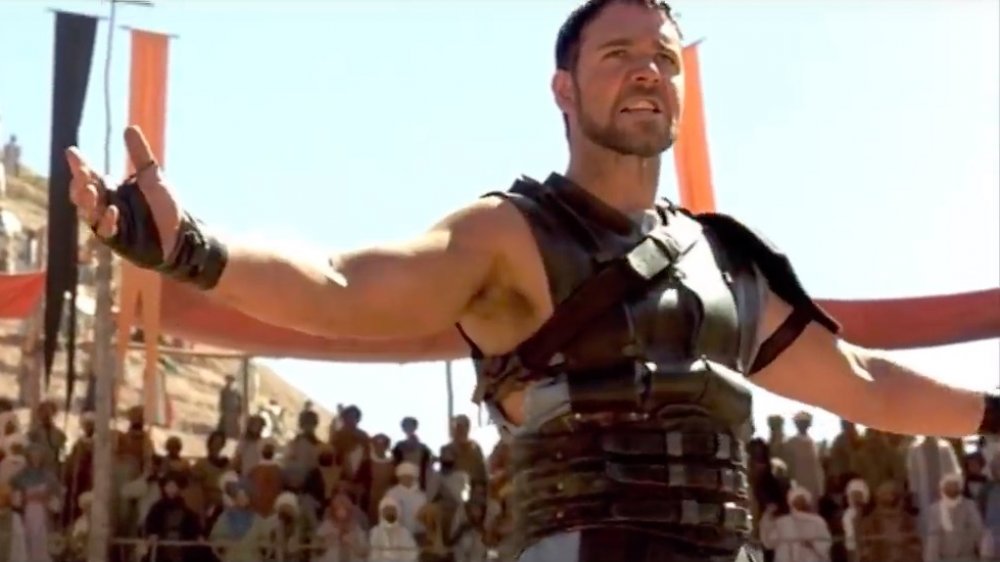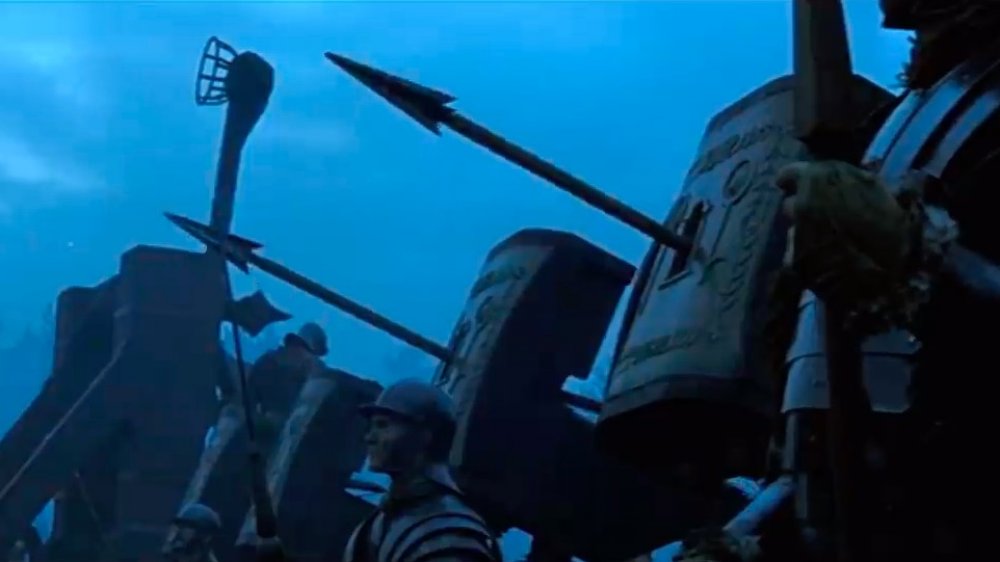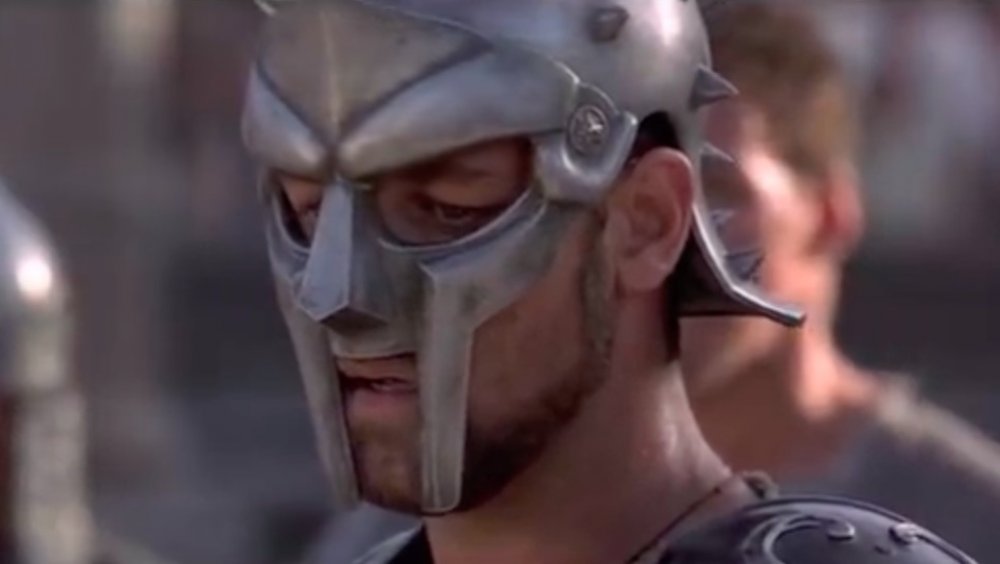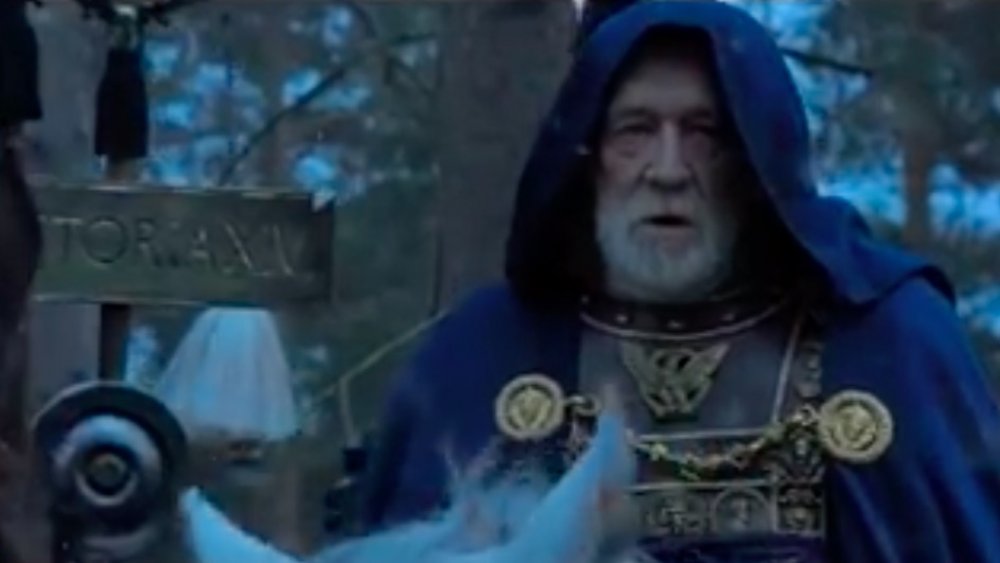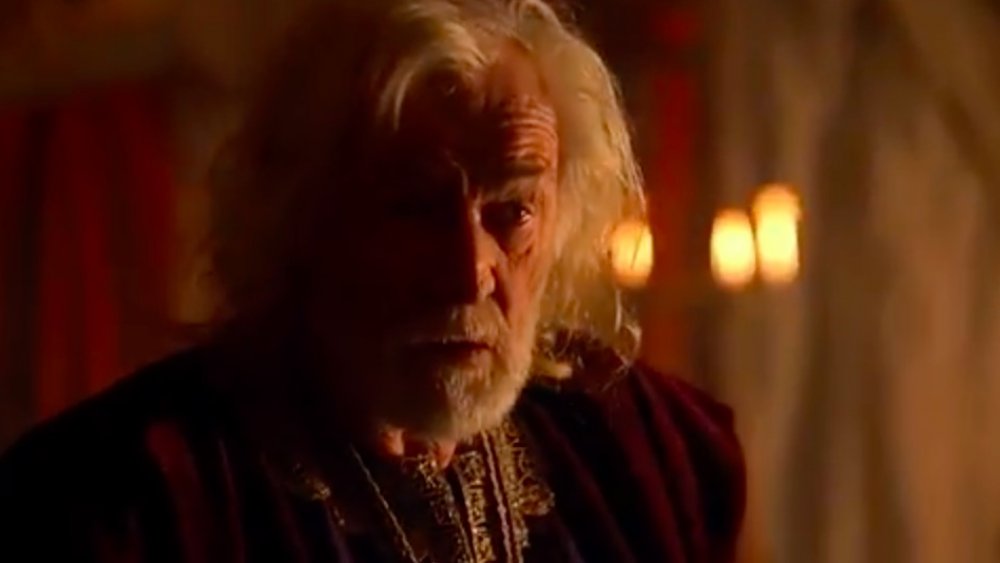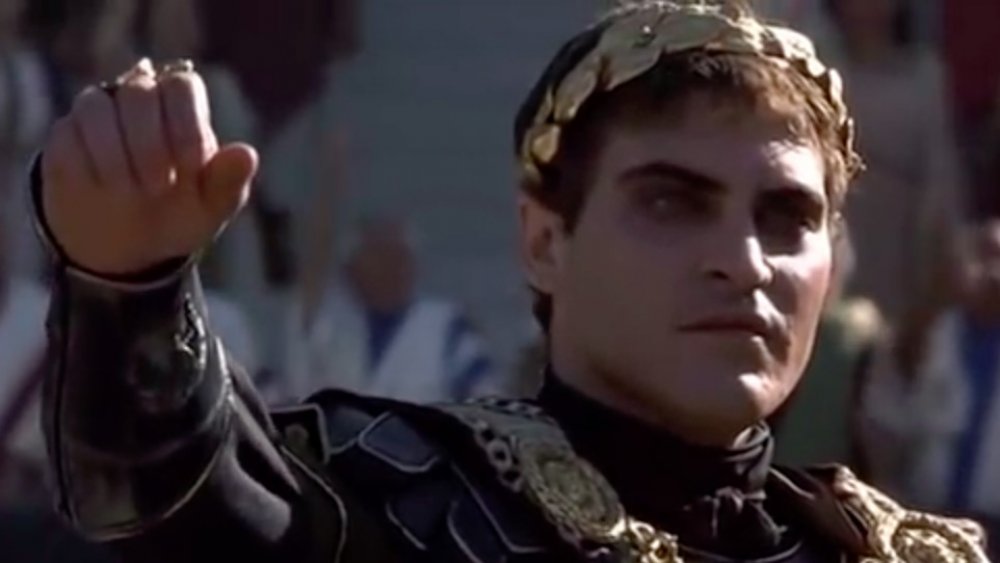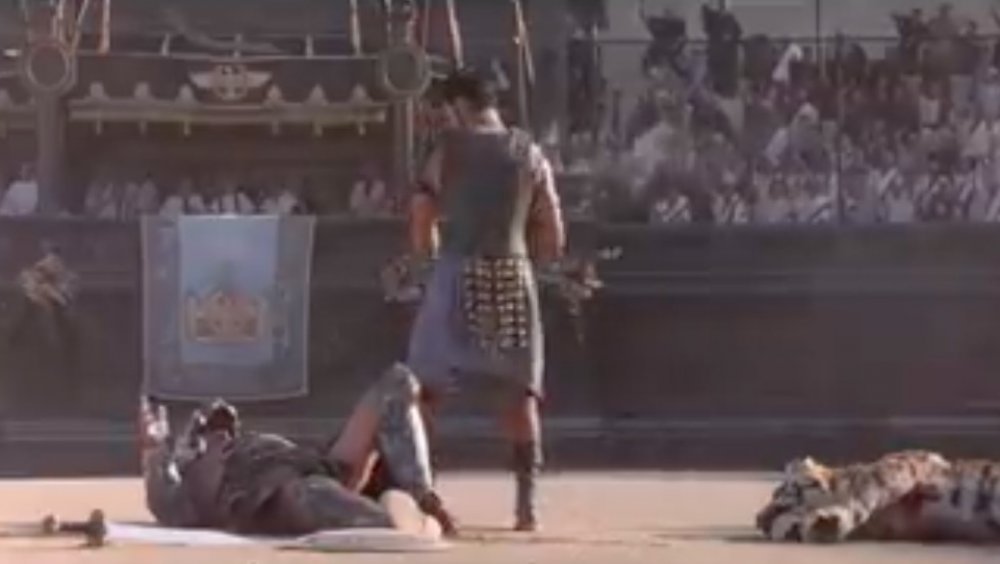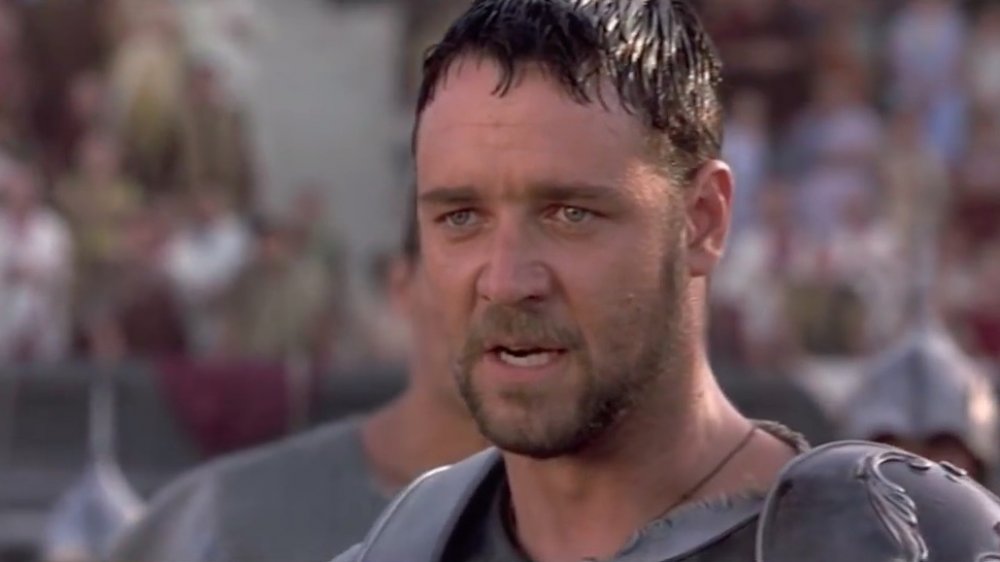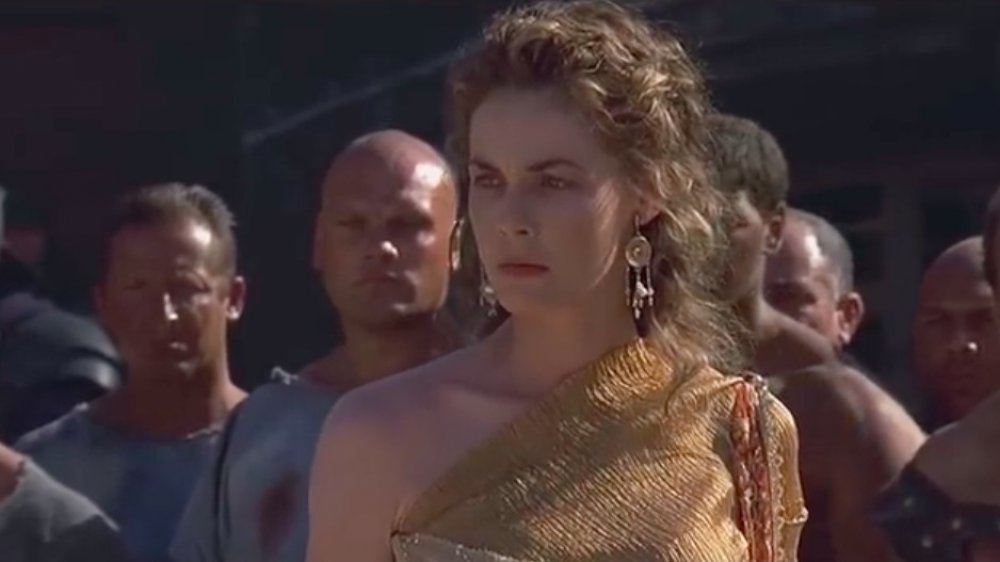Times Gladiator Lied To You
Are you not entertained? Because you're certainly not being educated or anything.
To be fair, Gladiator is a fictional story about a fictional man living in a real historical era, so it gets a little more leeway than a story like, say, the story of the Scottish hero William Wallace, who was a real person living in a real historical era. Still, you do expect a certain amount of truth whenever you're watching a film that's set in a time and place that you can actually read about in history books.
Alas, you're not going to find a whole lot of truth in either one of those stories, at least not as you've seen them on the big screen and not until someone who actually cares about historical accuracy comes along and revisits them. So just where did Gladiator go wrong? Here are some of the many places that you were not being told the truth while you were not (or were, no one's judging) being entertained.
Siege weapons weren't used in pitched battles like in Gladiator
In the opening scene of Gladiator, we see two armies lining up for a pitched battle in a forest. The Romans are unnervingly calm and organized, Maximus makes a stirring speech, the siege weapons are locked and loaded, and the butt-kicking commences. Wait, the siege weapons?
Siege weapons, which are called siege weapons for a reason, were solely a tool used in, you know, sieges — where an army surrounds a fortified city and lobs projectiles over or into the walls in an effort to wear down the occupants over a series of days or weeks or even months. In real life, the Roman army wouldn't have been dragging siege weapons around for use in a pitched battle, especially in a forest. According to the Romae Vitam, weapons like catapults and ballistae, which granted do look pretty awesome while pummeling the enemy with burning arrows and whatever those cannonball-sized things-on-fire were in that opening scene, were not used in the field, and were especially not used in forests where their effectiveness would have been greatly reduced. But hey, we viewers need something to help us understand the total badassedry of our protagonist, so okay, let's just pretend.
But wait, Gladiator's Maximus wasn't real either
There's nothing wrong with inventing fictional characters to help tell a fictional story set in an actual historical era — as long as those fictional characters are existing within either entirely fictional scenarios or entirely historically accurate scenarios. When it's sort of in between those things, well, that's when it starts to become a problem.
Maximus, the protagonist of the movie Gladiator, is a fictional character. According to Project Gutenberg, he might be sort of loosely based on a historical personality named Claudius Pompeianus, the Syrian who married Marcus Aurelius' daughter Lucilla and who Aurelius might have once considered as a pick for the next Caesar. There was also a historical Claudius Maximus, who was a philosopher and politician who also served as Marcus Aurelius' teacher. He's not a super well-known character and was only mentioned a few times in the classical sources.
Pretty much everything the fictional Maximus does in the film is also entirely made up. There's no evidence that Claudius Pompeianus ever plotted against Commodus and neither one of them went on to become a gladiator. But that's also forgivable — the intent of the film was more to provide a sense of the era, and that can be accomplished with an untrue story populated by untrue characters. But can it be done if the details are also untrue? Hmm.
Marcus Aurelius did not ban gladiator fights
Marcus Aurelius was a real person, and so was Commodus. The former ruled Rome from 161 to 180 AD, and he was indeed a wise man who often put the needs of the Roman people above his own needs, just as he is depicted in the film. And he wasn't a fan of gladiator spectacles — in fact he was so horrified by a lion that had been trained to eat human beings that he refused to look at it when it entered the arena. Some sources say he even placed restrictions on gladiatorial games such as requiring combatants to use blunted weapons so they wouldn't kill each other.
He did not, however, ban the games as depicted in the film. According to History Hit, the economy during the reign of Marcus Aurelius was kind of crappy, and what better way to distract the people from the fact that their lives were a bit difficult than to provide them with a spectacle of violence? He may not have loved the games, but he was savvy enough to understand that they were working in his favor.
Marcus Aurelius didn't want to restore the Republic
Here in the West, we decided long ago that the most noble political systems are the ones that most closely mirror our own. We're not down with the whole emperor thing and it's therefore easier to root for a royal person who believes in giving a voice to the masses. Therefore, if you're going to paint a royal person as noble, you have him waxing poetic about the importance of voting.
Marcus Aurelius was not pining for the days of the Republic, though, as he was depicted in the film. According to the New York Times, in the years before his ascension there had been a trend towards selecting a successor from a list of qualified candidates rather than simply handing rule down to the eldest son, which is kind of sort of better than a hereditary title, but it's still a pretty long way from democracy. And Marcus Aurelius was actually the first emperor in more than 80 years to deviate from that new tradition by choosing his son Commodus as his successor.
There's no evidence at all that Marcus Aurelius — who was himself an emperor — disliked or wanted to abolish the position of emperor. Such plans would have been nonsensical for a guy who is also clearly thinking about naming a successor.
Commodus wasn't obsessed with his own sister
How do you make sure your utterly despicable character is universally loathed by your audience? How about giving him a physical attraction to his own sister? Because the historical Commodus' actual deeds were clearly not enough to disgust viewers all by themselves.
So yeah, filmmakers did that. And it's not like there's much basis for this little plot gem either. Evidently, some historians speculated that Lucilla was jealous of Commodus' wife, but because of her social position, not because of who she was married to. According to Historical Histronics, there were a lot of people who disliked Commodus in his own time, so if the whole sisterly love thing had any basis in fact you're danged right they would have written it down. But it's not there, so writers could have easily spared everyone from the ick factor in favor of the other despicable things Commodus actually did, but never mind. In the filmmakers' defense, maybe some people would be okay with making dwarfs fight in the arena and covering disabled people with mustard and presenting them as banquet dishes (they weren't actually eaten, but that's still pretty awful), but everyone is most definitely not okay with a dude who's into his own sister. So ick it is. Thanks, writers.
Commodus did not kill his father
Let's see, how else can we made the audience hate Commodus? How about if we have him kill his own father? Extra hate points! Cool.
That didn't happen, either. Commodus was pretty despicable but killing his dad would have been absolutely pointless, since it was pretty clear to everyone that Aurelius had every intention of making him emperor. At the age of 13, Commodus joined his father on campaign and officially became a man. By the age of 16 he was a consul, and basically served as a co-emperor alongside his father until the age of 19, when Aurelius died and the throne was passed down to him. It's clear he didn't have to worry that he wasn't going to succeed his father because he'd been groomed for it for practically his entire life.
So how did Marcus Aurelius die really? Most sources just say "natural causes," though there is some speculation he may have died from Galen's plague, an epidemic that began in 164 that some scholars believe was actually smallpox. What we do know is that he wasn't smothered to death by his own son — that would have almost certainly made it into the history books.
Commodus was actually way more awful than he was in Gladiator
In the film, Commodus is pretty awful. He kills his dad, he lusts after his own sister, and he's just an all-around not-super-nice guy. As an audience, we don't have any trouble disliking him, mostly because of all of the fictional crimes that have been attributed to him.
But here's a funny thing — Commodus was really, really awful in real life, in fact, he was even more awful than he was depicted in the movie. No one needed to invent any fictional crimes for him because he had plenty of actual, non-fiction crimes that the casual viewer could use to conclude that yes, this guy was super-extra-not-very-nice. Among his many notable evil deeds: That time he dressed up a bunch of disabled people as mythological monsters and then had them all massacred in the arena.
According to All That's Interesting, eventually, Commodus just got tired of doing all that emperor stuff and handed the government over to his cruel and incompetent buddies while he went around chariot racing, fighting shirtless in the Colosseum, and executing people. He told everyone he was Hercules (the actual Hercules, reborn), he renamed all the months after some aspect of his imagined awesomeness, and he ordered the Colossus of Nero's head replaced with his own. Dude was a whack-job, and no one needed to see him committing incest and patricide to understand that.
Gladiators didn't always fight to the death
Roman Gladiators were sort of like human versions of race horses. It's tempting to compare them to illegal fighting roosters or dogs, because they fought each other for the entertainment of spectators, but like a racehorse, a human being is a lot more expensive to train and prepare than a rooster or a pitbull, and even pitbull fights aren't usually to the death.
Roman Gladiators were athletes, not sacrificial lambs. They weren't free, but the people who "owned" them — called lanistae — valued them and spent a lot of money on their training and upkeep. If gladiators only had a 50/50 chance of survival every time they went to work, then it wouldn't have been a very lucrative business, unless you were lucky enough to own the one guy that no one could ever manage to beat. And if that was you, you'd have a mighty difficult time finding another owner willing to pit one of his best guys against yours.
According to History, there might be the occasional fight to the death just to get spectators worked up, but that always came with some extra compensation for the lanistae. Most of the time, gladiators would fight until one of them was clearly beat, and then they'd both get to go back home and lick their wounds. No one is saying that being a gladiator was like being a modern-day professional wrestler (fake), but it wasn't necessarily a deadly profession, either.
Belgian shepherds weren't a thing
In the early scenes of the film, Maximus is accompanied by a dog — a Belgian shepherd, actually, since early plans to make the animal a trained wolf got thwarted by strict policies regarding the importation of wild animals. A Belgian shepherd is very similar in appearance to a German shepherd, and neither breed was a thing in Ancient Rome. In fact, both breeds are descended from a dog called a Continental Shepherd, which only dates back to the 1800s. Shepherds that were similar in appearance probably existed prior to that, but there was no breed standard for the Belgian Shepherd until 1892.
Belgian Shepherds kind of sort of look like wolves so it's a somewhat forgivable offense, but a better option would have been a malamute, which is a breed that can definitely pass for a wolf in low light. But it's not like anyone in the movie actually said, "Hey, nice wolf Maximus" or anything, so they didn't have to sell the audience on the part where the animal was definitely a wolf. So alternately, filmmakers could have chosen a mastiff-type dog or some generic looking mutt, both of which definitely existed in Ancient Rome.
No one spoke Italian in ancient Spain
Okay so everyone calls Maximus "Spaniard" which means he's from Spain (or more accurately Iberia or Hispania, since Spain didn't actually exist at the time). After the Romans took over, the primary language spoken in the region was Latin (which is the language Spanish descended from). But according to Romae Vitam, when the soldiers ride up to Maximus' farm, his son says "Mama! I soldati!," which is neither Latin nor Spanish — it's Italian. Italian descended from Latin, too, but like Spanish it didn't start to emerge as a distinct language until around 800 AD, centuries after the events depicted in the film. Really, how hard would it have been to have the little boy in the film say "milites" instead of "soldati?" Unless no one could actually be bothered to find out what language would have been spoken in Hispania during that time ... which is starting to sound kind of likely.
Gladiator's naming conventions were all wrong and backwards
Maximus' name is all messed up, too. In the arena, Maximus announces himself as "Maximus Decimus Meridius," which doesn't fit the normal Roman naming convention. According to Historical Histrionics, in Rome, people had at least three names — their given name, (like Bob) which came first, followed by the family name (like Smith), which came second, followed at the end by a nickname, which was used to distinguish you from family members with similar names (like "The Great" or something).
But Maximus seems more like a nickname, since it means "the largest." And Meridius means "from the South" and Decimus sounds more like a given name. At some point in the script the name "Aelius" is used, which could be a family name, but everything is all out of order. Really, Maximus' name ought to be "Decimus Aelius Meridius Maximus," not "Maximus Decimus Meridius." So filmmakers were either dumbing it down so their audiences didn't go, "But first names come first!" or they genuinely had no idea how Roman naming conventions worked.
Commodus was assassinated
Commodus did like to fight in the arena. In fact he liked it so much that that was pretty much his only duty as emperor towards the end of his life. But Commodus was never really in any danger in the arena, since he entered fully armed and battled opponents who were carrying wooden weapons. So the idea that he might have died in the arena is patently ridiculous.
In fact, everyone hated Commodus so he met his end in much the same way as a lot of other unpopular historical figures — he was assassinated. According to History of the Roman People, the straw that broke the gladiatorial tiger's back was his plan to move into gladiatorial barracks, kill two consuls, and name himself as sole consul. At least, that's what the rumors said. Anyway, everyone was pretty fed up including Commodus' mistress Marcia, who poisoned his dinner on December 31, 192. Unfortunately the conspirators' plans were ill-timed because Commodus got so drunk during the end-of-the-year party that he threw up most of the poison, so they had to send in a guy to strangle him while he was recovering in the bathtub.
Commodus was so hated, in fact, that they were just going to throw his body into the river, and his successor had to step in and make sure he got a proper send-off, though no one is really sure why he gave a damn.
Lucilla didn't get a happy ending
Maximus doesn't get a happy ending but hey, at least Lucilla does, right? Well, in real life Lucilla doesn't get to be all regal over the body of her slain brother and his enemy, nope, because when Commodus finally got what was coming to him she'd already been dead for quite some time. According to The Ancient Rome Handbook: A Historical Guide for Travelers, the real Lucilla had a pretty sordid romantic life — early on she was forced to marry her uncle (though to be fair, he was Marcus Aurelius' adopted brother). After the death of her first husband, she married one of her father's generals.
After her father died, Lucilla started plotting against her brother — her reasons aren't super clear, but some sources think it was because she knew how unhinged he really was. She got her son-in-law (who was also her lover) in on a plot to assassinate Commodus, but the plot failed, the conspirators were exposed, and Lucilla was exiled to the island of Capri. Commodus was way too paranoid to be satisfied with mere banishment, though, and he had her assassinated the same year. So no happy endings for anyone, except for all of Rome when Commodus was finally dead.
